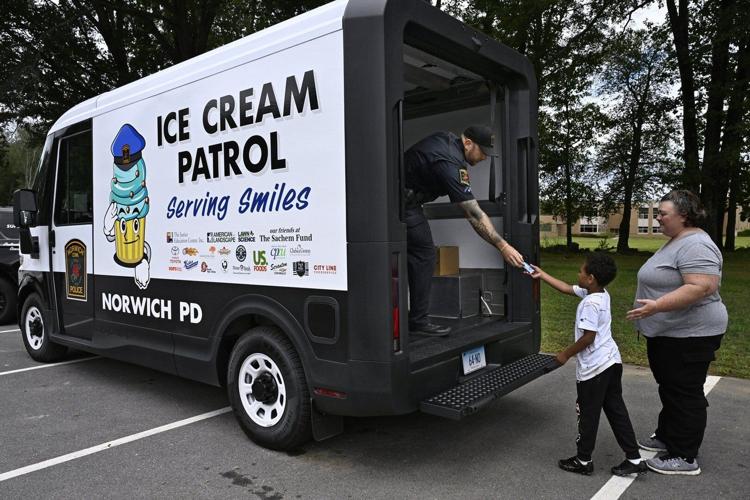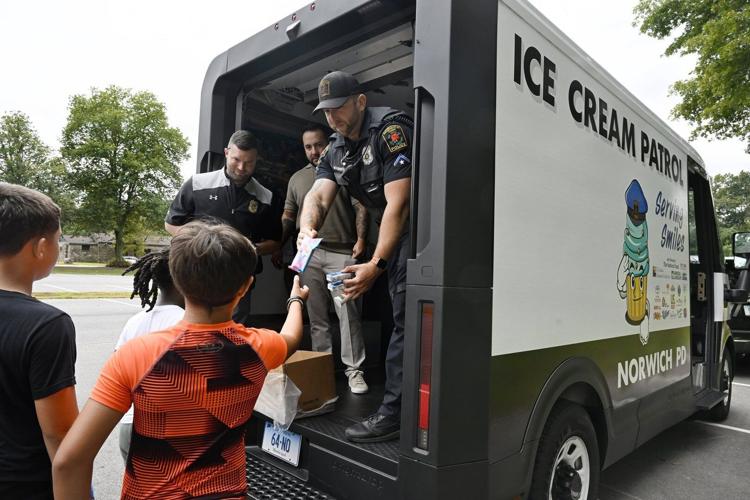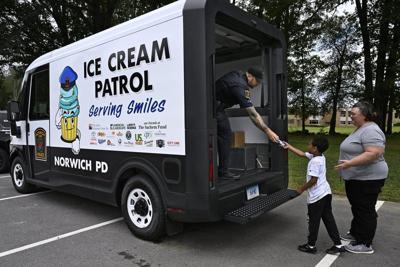NORWICH, Conn. (AP) ŌĆö The puns are plentiful as police departments around the country buy their own ice cream trucks and roll into neighborhoods to hand out frozen treats for free.
ŌĆ£Copsicle PatrolŌĆØ is written on the one in Danbury, Connecticut. ŌĆ£Freeze! You have the right to remain frozen,ŌĆØ says another in Pittsfield, Massachusetts. ŌĆ£LetŌĆÖs Chill Together,ŌĆØ ClevelandŌĆÖs proclaims. ŌĆ£Frosty Five-O. Get the inside scoopŌĆØ declares one in Palm Bay, Florida. ŌĆ£To Protect and Soft Serve,ŌĆØ says yet another in Toldedo, Ohio.
Whimsical slogans aside, a growing number of local law enforcement outfits are using the trucks for a serious mission: to have positive interactions with their communities at a time when headlines often feature police brutality and misconduct.
ŌĆ£There is no better way to draw the community to approach the police and let them know that we are approachable, weŌĆÖre humans as well, than by handing out free ice cream to the kids,ŌĆØ said Lt. Kyle Besse of the Norwich, Connecticut, police department. ŌĆ£The smiles on the kidsŌĆÖ faces are really what make you realize that this is a great community outreach service.ŌĆØ
Norwich policeŌĆÖs all-electric Chevy BrightDrop van debuted in early August, with about 90% of the $43,000 cost coming from donations from area businesses and contributors, and the rest from the city. Some departments have used tax revenue from legal marijuana sales and property seizures to fund their ice cream operations.
ŌĆśSeeing kids be happyŌĆÖ
On a recent day, Norwich’s van stopped at a local school where children were participating in sports camps. It was a hit as officers handed out ice cream sandwiches, bubble gum-flavored pops and Italian ices.
ŌĆ£Instead of seeing people in jail, theyŌĆÖre seeing kids be happy,ŌĆØ said 11-year-old Rozzy Constant, who opted for the bubble gum pop.
The truck later rolled into an apartment complex. In a police cruiser accompanying the truck, Besse used his phone to play ice cream truck songs through the exterior loudspeaker. The department is now raising money to outfit the truck with its own sound system and police lights.
Angela Pires heard the music and rushed out with her grandchildren.
ŌĆ£ItŌĆÖs a great idea. Not everybody can afford it,ŌĆØ she said. ŌĆ£Police get a lot of bad publicity. ItŌĆÖs about time that they get good things said about them.ŌĆØ
Marijuana tax and property seizures fund some programs
Like Norwich, many departments’ ice cream truck programs are funded by donations, and the treats they hand out for free are often provided to them at no charge by local businesses like grocery stores and ice cream shops. Norwich police list 20 sponsors on their truck.
In Danbury, Connecticut, police used tax revenue from the cityŌĆÖs legal marijuana dispensaries to pay for their truck, which hit the streets in July and was the first one in the state.
In Chicopee, Massachusetts, police paid for theirs with assets seized during criminal arrests. That practice, called , has been criticized by criminal justice advocacy groups because state and local laws allow law enforcement to take property from someone suspected of criminal activity and keep it even if criminal charges are never filed.
And some departments have used federal law enforcement grants to help fund the projects.
Paul Poirier, the police chief in Barnstead, New Hampshire, used his own money to buy an old ice cream truck that he refurbished with a friend and donated to his department a couple years ago.
Today, he runs a business named Copsicle Ice Cream Trucks in his spare time that restores and repairs ice cream vehicles to sell to police departments starting at around $37,000.
ŌĆ£I figured, you know what, this would be a great opportunity for the kids and families to get free ice cream and make those connections and see the police in a more positive light,ŌĆØ said Poirier, who said he’s been fielding calls from police departments as far away as California showing interest in the trucks.
Boston police hand out ice cream for 15 years
Boston police are widely credited with having the first official police ice cream truck in the U.S.
In partnership with the HP Hood ice cream company, whose half vanilla and half chocolate ice cream cups are iconic in New England, the city began ŌĆ£Operation Hoodsie CupŌĆØ in 2010. Police in other parts of the country, including St. Louis, Miami and Milwaukee, would deploy their own ice cream trucks in the following years.
Over the past 15 years, Hood has donated all the ice cream for Boston’s truck, which goes to more than 400 events in city neighborhoods each year, police said. Its current truck was donated by the nonprofit Boston Police Foundation in 2016.
“Each interaction is an opportunity for our officers to build trust with community, and to make some smiles in the process,ŌĆØ said Boston Police Commissioner Michael Cox said in a statement.
The ice cream trucks are another program in a long line of community policing initiatives that many departments have put in place over the years, such as ŌĆ£Coffee with a CopŌĆØ and youth sports programs.
Whether the trucks are actually improving the public’s opinion of police over the long term isn’t clear due to a lack of research on the subject, said Kenneth Quick, an adjunct professor at John Jay College of Criminal Justice in New York and a former New York City police inspector.
ŌĆ£I like that it is bringing the police out in the community, sort of showing them in a different light, that they are humans,ŌĆØ Quick said.
However, he asked, ŌĆ£Is this an actual meaningful interaction thatŌĆÖs really going to shape somebodyŌĆÖs long-term perceptions about the police, or is it going be ŌĆśI got a free ice cream sandwich from some cop in an ice cream truckŌĆÖ but yet later on down the road when I actually have a meaningful interaction my perceptions are the same?ŌĆØ































